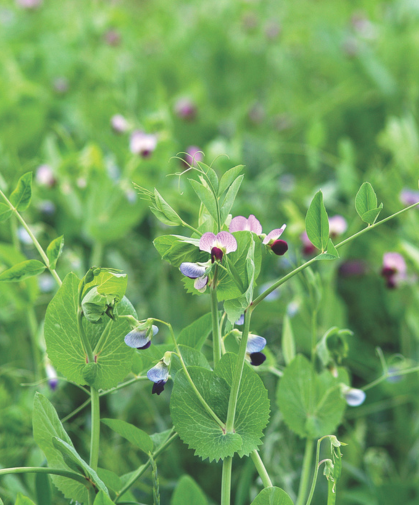- Exceed Peanut Cowpea Lespedeza Mung Bean Inoculant | Label
- Peas (Cover Crops) | Key Growing Information
- Exceed Pea, Vetch & Lentil Inoculant | Information Sheet (PDF)
- Alfalfa & True Clover Inoculant | Label
- Exceed Peanut Cowpea Lespedeza Mung Bean Inoculant | OMRI Certificate
- Soybean Inoculant | Label
- Exceed Alfalfa/True Clover Inoculant | OMRI Certificate
- Exceed Peat Rhizobium Inoculants | SDS (PDF)
- Clovers & Alfalfa | Key Growing Information
- Exceed Pea, Vetch & Lentil Inoculant | OMRI Certificate
- Sunn Hemp | Key Growing Information
- Exceed Soybean Inoculant | Information Sheet (PDF)
- Exceed Alfalfa/True Clover Inoculant | Information Sheet (PDF)
- Inoculants | General Information Sheet
- Hairy Vetch | Key Growing Information
- Exceed Soybean Inoculant | OMRI Certificate
- Exceed Garden Combination Inoculant | Information Sheet (PDF)
Peas (Cover Crops) - Key Growing Information

Uses: Short-term spring or fall green manure, either grown alone or in mixes. Vigorous growth in cool weather, protects soil against erosion, and suppresses weeds. Also, for small, yellow, dry soup peas or pea tendrils for salad mix. Blossoms are quite showy and attractive to pollinators.
Culture: Green manure: Sow in early to midspring, or in late summer/early fall. Seeds should be inoculated with a pea-type inoculant (#7534) and planted 1½–3" deep in moist soil. Peas are best drilled, but if broadcasting, sow at a higher rate and harrow or rake in to ensure adequate germination. Peas are often planted with spring grains to maximize organic matter and minimize weed competition. For fresh and dry peas, sow as early as possible in spring in 3" bands (25 seeds/ft) at 1½–3" depth.
Seeding Rate: 5 lb./1,000 sq.ft., 200 lb./acre when planted alone. 3 lb./1,000 sq.ft., 120 lb./acre in a mix.
Light Requirements: Full sun to partial shade.
Soil Requirements: Peas prefer well-drained, near-neutral pH, with moderate fertility. Susceptible to drought due to shallow root systems.
Height: 24–36"
Harvest: Seeds - Harvest when pods are mature, 20–30 days after blooming or 52–75 days after planting. Pull the vines when they are about half dried and pile (under cover if possible) to complete drying. Thresh out seeds and winnow to clean. Store peas in a cool, dry place.
Termination: As a green manure, peas can be tilled under at any point, though for maximum nitrogen fixation, wait until plants have flowered. Due to their height, mowing before tillage may make incorporation easier. Tarping for 2–3 weeks is effective on a smaller scale. Peas are not frost-tolerant, so they are a good option for a winterkilled cover crop when sowing in the fall.

